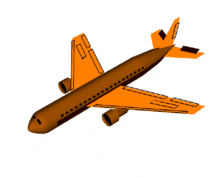
Elevators are flight control surfaces, usually at the rear of an aircraft, which control the aircraft's pitch, and therefore the angle of attack and the lift of the wing. The elevators are usually hinged to the tailplane or horizontal stabilizer. They may be the only pitch control surface present, sometimes located at front (early airplanes) or integrated into a rear "all-moving tailplane" also called a slab elevator or stabilator.
The horizontal stabilizer usually creates a downward force which balances the nose down moment created by the wing lift force, which typically applies at a point (the wing center of lift) situated aft of the airplane's center of gravity. The effects of drag and engine thrust may also result in pitch moments that need to be compensated with the horizontal stabilizer.
Both the horizontal stabilizer and the elevator contribute to pitch stability, but only the elevators provide pitch control. They do so by decreasing or increasing the downward force created by the stabilizer :